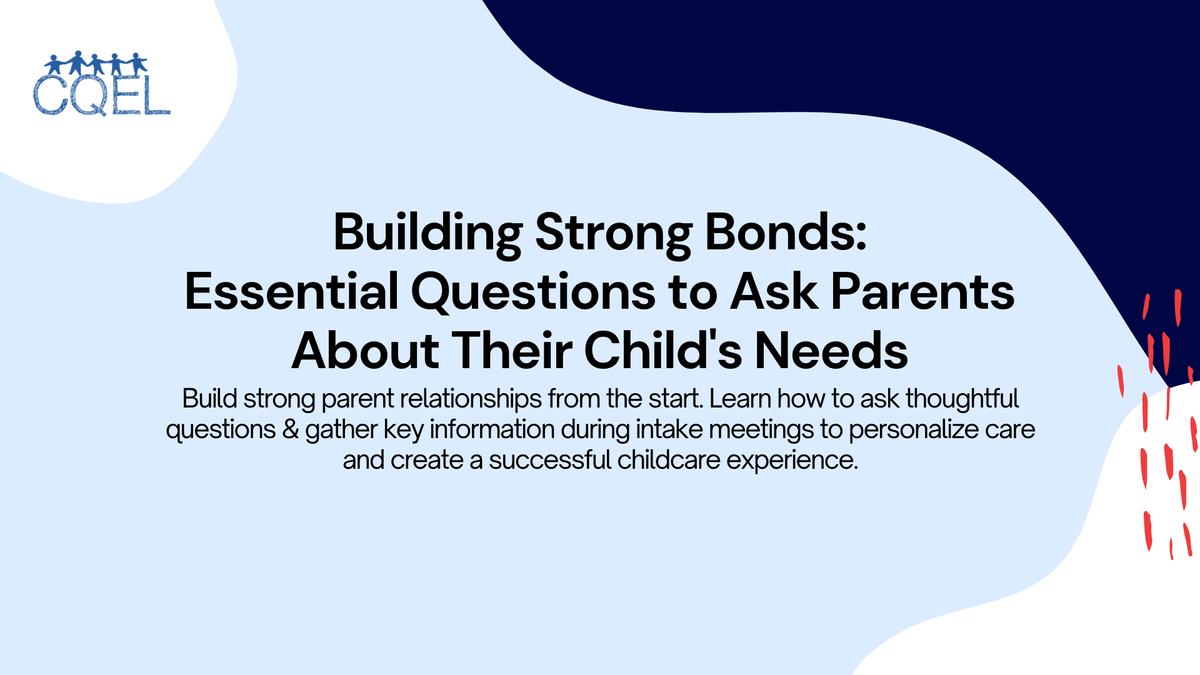Building Strong Bonds: Essential Questions to Ask Parents About Their Child's Needs
Build strong parent relationships from the start. Learn how to ask thoughtful questions & gather key information during intake meetings to personalize care and create a successful childcare experience.

Building strong relationships with parents is the cornerstone of a successful childcare experience. Open communication and understanding a child's individual needs are crucial for fostering a nurturing and supportive environment. Intake conversations, those initial meetings with parents before their child starts your program, present a golden opportunity to gather valuable information and lay the foundation for a positive partnership. By asking thoughtful questions, you can gain valuable insights into a child's development, routines, and preferences, ultimately allowing you to provide care that is tailored to their unique needs.
Understanding a child's developmental stage and learning style is paramount. Questions like "Has your child met any recent developmental milestones?" or "How does your child typically learn best (visually, through hands-on activities, etc.)?" can provide a roadmap for nurturing their cognitive and social skills. Remember, the specific questions you ask will vary depending on the child's age group. For infants, you might inquire about feeding schedules and sleep patterns, while for toddlers, questions about potty training or separation anxiety might be relevant. Tailoring your questions to the child's developmental stage allows you to gather targeted information and create a personalized learning approach.
A child's daily routines, sleep patterns, and eating habits all play a significant role in their well-being. Knowing "What is your child's typical nap schedule at home?" or "Are there any foods your child dislikes or has allergies to?" ensures a smooth transition and minimizes disruptions for the child. Learning about the child's preferred activities and communication style (verbal, nonverbal cues) is equally important. Do they thrive on outdoor play or quiet reading time? Do they express their needs readily or require gentle coaxing? Understanding these preferences allows you to create a stimulating environment that caters to their individual way of interacting with the world.
Discipline and behavior management are crucial aspects of any childcare setting. Aligning with parents on these matters fosters consistency and security for the child. Questions like "How do you typically handle tantrums at home?" or "What communication methods work best for your child?" open the door to collaboration. Perhaps a time-out strategy works well at home, or maybe positive reinforcement is the preferred approach. By collaborating with parents and establishing a unified approach, you can ensure a consistent message for the child and minimize challenging behaviors.
Some children may have special needs, developmental delays, or medical conditions that require specific care considerations. Sensitivity is key here. Phrased with care, questions like "Has your child ever been evaluated for any developmental delays?" or "Are there any specific medical conditions or allergies I should be aware of?" open the door for parents to share vital information. Maintaining confidentiality is paramount, and working collaboratively with parents allows you to develop an individualized care plan that addresses the child's unique needs while ensuring their safety and inclusion within the program.
Intake conversations are not simply formalities – they are opportunities to build trust and establish a foundation for ongoing communication with parents. By asking thoughtful questions and actively listening to their responses, you gain valuable insights into the child's world. The California Department of Education's Early Learning and Development Standards (ELDS) (https://www.cde.ca.gov/be/st/ss/) provides a framework for assessing a child's development across various domains. Remember, open communication is a two-way street, and by taking the initiative during intake conversations, you lay the groundwork for a successful and enriching childcare experience for all children entrusted to your care.
